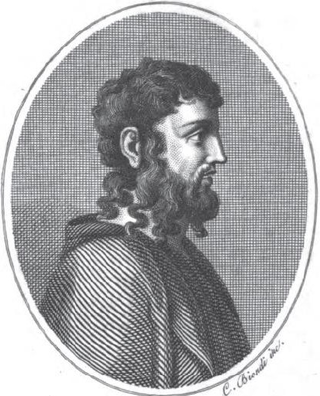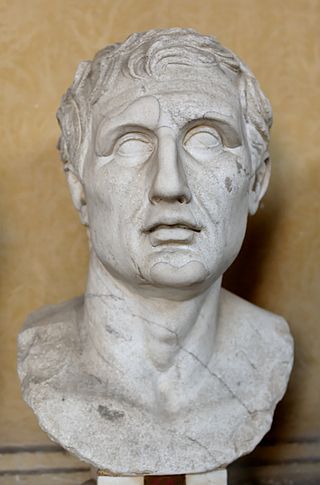Related Research Articles

Aristophanes, son of Philippus and Zenodora, of the deme Kydathenaion, was a comic playwright or comedy-writer of ancient Athens and a poet of Old Attic Comedy. Eleven of his forty plays survive virtually complete. These provide the most valuable examples of a genre of comic drama known as Old Comedy and are used to define it, along with fragments from dozens of lost plays by Aristophanes and his contemporaries.

Dicaearchus of Messana, also written Dikaiarchos, was a Greek philosopher, geographer and author. Dicaearchus was a student of Aristotle in the Lyceum. Very little of his work remains extant. He wrote on geography and the history of Greece, of which his most important work was his Life of Greece. Although modern scholars often consider him a pioneer in the field of cartography, this is based on a misinterpretation of a reference in Cicero to Dicaearchus' tabulae, which does not refer to any maps made by Dicaearchus but is a pun on account books and refers to Dicaearchus' Descent into the Sanctuary of Trophonius. He also wrote books on ancient Greek poets, philosophy and politics.

Menander was a Greek dramatist and the best-known representative of Athenian New Comedy. He wrote 108 comedies and took the prize at the Lenaia festival eight times. His record at the City Dionysia is unknown.
Stephanus or Stephen of Byzantium was a Byzantine grammarian and the author of an important geographical dictionary entitled Ethnica (Ἐθνικά). Only meagre fragments of the dictionary survive, but the epitome is extant, compiled by one Hermolaus, not otherwise identified.

Johann Albrecht Friedrich August Meineke, German classical scholar, was born at Soest in the Duchy of Westphalia. He was father-in-law to philologist Theodor Bergk.
Black soup was a regional cuisine of ancient Sparta, made with boiled pork meat and blood, using only salt and vinegar to flavour. The soup was well known during antiquity in the Greek world, but no original recipe of the dish survives today. The earliest recorded mention of the soup can be dated to the fifth century BC, in a comedy titled The Miners, written by Pherecrates. The ancient sources provide contradictory accounts on whether the soup was a luxurious meal served only at banquets or a dish that could be afforded by all Spartiates. Throughout history, black soup has been praised by and associated with figures such as Benjamin Rush and Adolf Hitler although Hitler was vegetarian.

Eupolis was an Athenian poet of the Old Comedy, who flourished during the time of the Peloponnesian War.
Hecataeus of Abdera or of Teos, was a Greek historian who flourished in the 4th century BC. Though none of his works survive, his writings are attested by later authors in various fragments, in particular his Aegyptica, a work on the society and culture of the Egyptians, and his On the Hyperboreans. He is one of the authors whose fragments were collected in Felix Jacoby's Fragmente der griechischen Historiker.

Ancient Greek comedy was one of the final three principal dramatic forms in the theatre of classical Greece. Athenian comedy is conventionally divided into three periods: Old Comedy, Middle Comedy, and New Comedy. Old Comedy survives today largely in the form of the eleven surviving plays of Aristophanes; Middle Comedy is largely lost, i.e. preserved only in relatively short fragments by authors such as Athenaeus of Naucratis; and New Comedy is known primarily from the substantial papyrus fragments of Menander.
Abron or Habron was the name of a number of people in classical Greek history:
Eunicus is the name of two different people in Classical history:
Chamaeleon, was a Peripatetic philosopher of Heraclea Pontica. He was one of the immediate disciples of Aristotle. He wrote works on several of the ancient Greek poets, namely:
Ludolf Küster (1670–1716) was a Westphalian scholar, philologist, textual critic, palaeographer, and editor of Greek ancient texts.
Pamphile or Pamphila of Epidaurus was a historian of Egyptian descent who lived in Greece during the reign of the Roman emperor Nero and wrote in Greek. She was the first known female Greco-Roman historian and, along with Ban Zhao, one of the first known female historians. She is best known for her lost Historical Commentaries, a collection of miscellaneous historical anecdotes in thirty-three books, which is frequently cited by the Roman writer Aulus Gellius in his Attic Nights and by the Greek biographer Diogenes Laërtius in his Lives and Opinions of Eminent Philosophers. She is also described in the tenth-century Byzantine encyclopedia, the Suda, and by the Byzantine writer Photios. According to the Suda, she wrote a large number of epitomes of the works of other historians as well as treatises on disputes and sex. She may be the author of the anonymous surviving Greek treatise Tractatus de mulieribus claris in bello, which gives brief biographical accounts of the lives of famous women.
Philyllius, also called Phillylius, Phlaeus, Philolaus, or Phillydeus, was an ancient Athenian comic poet. He was a contemporary of Diocles and Sannyrion. He belonged to the latter part of the Old Comedy tradition and the beginning of the Middle Comedy tradition. He seems to have attained to some distinction before 392 BC, when the Ecclesiazusae of Aristophanes was performed.
Theon of Alexandria was a grammarian who taught at Rome in the reigns of the emperors Augustus and Tiberius. He succeeded Areius in this role, and was succeeded by Apion. He was the son of the grammarian Artemidorus of Tarsus and the head of the school at Alexandria.
Lopadotemachoselachogaleokranioleipsanodrimhypotrimmatosilphiokarabomelitokatakechymenokichlepikossyphophattoperisteralektryonoptekephalliokigklopeleiolagoiosiraiobaphetraganopterygon is a fictional dish originating from Aristophanes' 391 B.C. comedy Assemblywomen, deriving from a transliteration of the Ancient Greek word λοπαδοτεμαχοσελαχογαλεοκρανιολειψανοδριμυποτριμματοσιλφιοκαραβομελιτοκατακεχυμενοκιχλεπικοσσυφοφαττοπεριστεραλεκτρυονοπτοκεφαλλιοκιγκλοπελειολαγῳοσιραιοβαφητραγανοπτερύγων. In A Greek–English Lexicon, it is defined as a "name of a dish compounded of all kinds of dainties, fish, flesh, fowl, and sauces".
Platonius is the author of two writings on Greek comedy, which have been preserved in excerpts: On the Characteristics of Comedies and On the Characteristics of Styles, which today form part of the collection Prolegomena de comoedia.
Dionysiades of Tarsus was an ancient Greek tragic poet who lived in the time of Alexander the Great. According to Strabo, he was the best of the tragic poets included in the so-called Alexandrian Pleiad.
Aristomenes was a comic poet who lived in Athens in the 5th century BCE. He belonged to the ancient Attic comedy known as the Old Comedy, or more correctly to the second class of the poets constituting the old Attic comedy. For the ancients seemed to distinguish the comic poets who lived before the Peloponnesian War from those who lived during it, and Aristomenes belonged to the latter category. He was sometimes ridiculed with the name "the woodworker", which may indicate that either he or his father was an artisan who worked with his hands, perhaps a carpenter.
References
- ↑ Prolegomena de comoedia in Wilhelm Dindorf (ed.), Aristophanis Comoediae, pp. 19–44.
- ↑ Cf. Suda, s.v. Ἀριστοφάνης.
- ↑ Suda, s.v. Διονυσιάδης.
- ↑ Rudolf Pfeiffer, History of Classical Scholarship: from the Beginnings to the End of the Hellenistic Age, Oxford, 1968, p. 160.